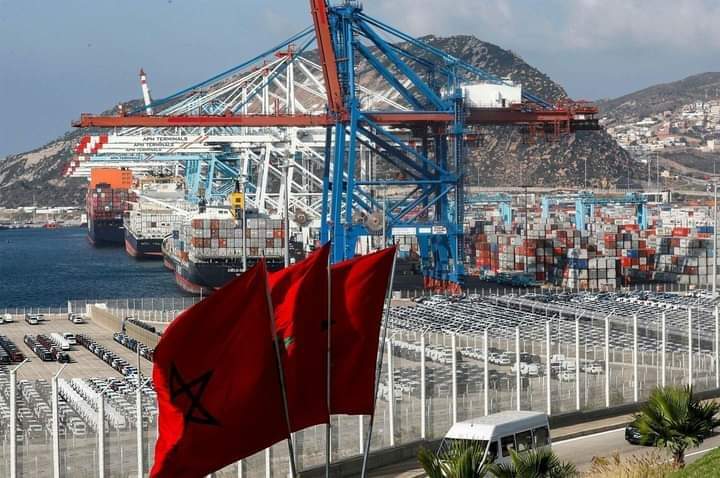Morocco, strategically located at the crossroads between Europe, Africa, and the Middle East, is embarking on an ambitious logistical transformation. Through major projects such as the development of the new Dakhla Atlantic port and the expansion of TangerMed port, the kingdom aims to become a leading logistics hub. These initiatives reflect a clear vision: to boost the economy, attract investments, and strengthen trade exchanges.
The Atlantic Gateway: Dakhla Port
The Dakhla Atlantic port is a flagship project in the development of Morocco’s southern provinces. With a budget of 12.5 billion dirhams, it is located 40 kilometers north of Dakhla in the Al Argoub municipality, chosen for its favorable nautical conditions. This port will not only serve commerce but will also be an integrated port complex, including an industrial and logistics zone of 9999 hectares, aimed at stimulating the economic, social, and industrial development of the region in various sectors such as fishing, agriculture, energy, and tourism.
Project Key Points
- Regional Economic Development: The port will support the economic, social, and industrial development of the region in all productive sectors.
- Connectivity and Logistics: It will provide competitive port infrastructure and industrial spaces, thus supporting the creation of a modern fishing fleet and the protection of Dakhla Bay’s unique environment.
- Employment Impact: The construction has already created nearly 2500 direct and indirect jobs, with an increase expected due to the activity generated around the infrastructure.
- Industrial and Logistics Zone: Backed by the port and the RN1, it will strengthen trade links between Morocco and the rest of the continent, notably West Africa and the Sahel region.
The Expansion of TangerMed Port
TangerMed, already a global leader, continues to expand to consolidate its position as the main gateway for Morocco’s international trade. Located on the Strait of Gibraltar, TangerMed plays a crucial role in global maritime trade and the economic integration of Morocco with Europe, Africa, and beyond.
The TangerMed port expansion is an investment project of 650 million euros, mainly focused on extending the capacity of its passenger and truck terminal and modernizing its import area. The International Finance Corporation (IFC) has planned to provide a loan of 150 million euros, while the World Bank has granted a loan of 714 million euros to various contributors. JP Morgan Chase has also contributed 255 million euros. The project aims to increase the terminal’s road capacity by 13% by 2029 and 43% by 2032 and is expected to have significant market development effects by improving international connectivity.
Nador West Med: A Catalyst for Growth
The Nador West Med port, essential to the Moroccan maritime strategy, aims to enhance trade and logistics near Nador, complementing TangerMed and Dakhla Atlantic. This project plans to handle millions of tons of goods, thus boosting the economy of northeastern Morocco with advanced infrastructure, including a main quay and a container terminal. It will also promote local employment and attract foreign investments through adjacent industrial and logistics zones. Integrating with other Moroccan ports, Nador West Med reinforces Morocco’s position as a major logistics hub between Europe, Africa, and beyond, highlighting the country’s commitment to developing its infrastructure to boost its economy and influence in global trade.
Strengthening Maritime Infrastructure
Morocco’s strategy for the development of its ten ports is designed to leverage its strategic geographical position, acting as a bridge between Europe, Africa, and the rest of the world. TangerMed serves as a success model, ranking among the largest ports in the Mediterranean and Africa, thanks to its operational efficiency and capacity to attract significant international trade flows. The expansion of TangerMed and the construction of new ports like Dakhla Atlantic and Nador West Med aim to increase this capacity, thus offering new opportunities for trade, investment, and economic growth.
Economic and Commercial Development
These port projects are not just engineering feats; they are at the heart of Morocco’s economic strategy. They aim to improve the country’s economic integration with its African neighbors, Europeans, and other global trade partners. By facilitating smoother trade and creating nearby free zones and industrial areas, Morocco hopes to attract more foreign investments, boost exports, and create jobs. This approach is also intended to support the development of key sectors such as industry, agriculture, and renewable energies, by providing them with a competitive logistical and commercial platform.
An Integrated Vision
Morocco’s strategic vision extends beyond the physical expansion of its ports. It includes the integration of advanced technologies for port and logistics management, improving land transport connections with the hinterland, and developing skills in local communities to support inclusive economic growth. Simultaneously, Morocco is working towards environmental protection and sustainable development, ensuring that port expansion and increasing trade activities do not come at the expense of its natural resources. These efforts reflect a national ambition to become a leader in global maritime trade and play a pivotal role in Africa and the Mediterranean’s maritime economy.
Morocco, strategically positioned at the crossroads between Europe, Africa, and the Middle East, is embarking on an ambitious logistical transformation. Key projects like the development of the new Dakhla Atlantic port and the expansion of the TangerMed port are central to the kingdom’s aim to become a leading logistics hub. These initiatives underscore a clear vision: to boost the economy, attract investment, and enhance trade exchanges.
Conclusion
By catalyzing the development of its port infrastructures through projects like TangerMed, Dakhla Atlantic, and Nador West Med, Morocco asserts itself as a key logistics hub, promoting economic integration and international trade. These efforts reflect an ambitious strategy to energize the economy, encourage investments, and optimize trade exchanges, positioning the kingdom as a major player at the crossroads of Europe, Africa, and the Middle East.
Related Articles:
